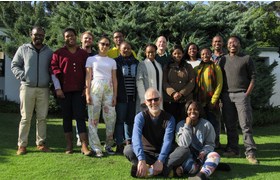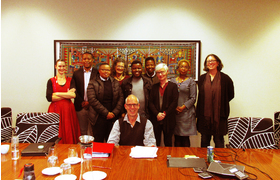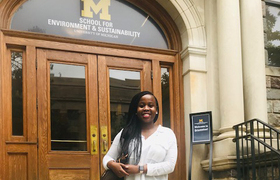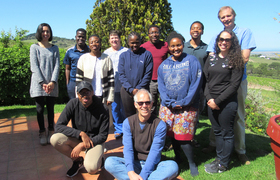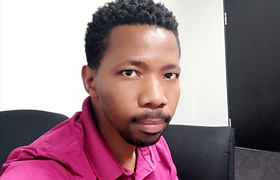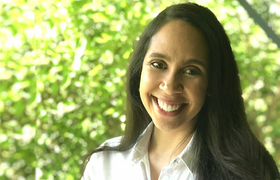Simon Chili: new nGAP lecturer in mathematics
03 May 2021 | Story and Photo Robert Morrell. Read time 4 min.
Simon Chili found a passion for mathematics in the latter years of primary school. He became fascinated by the subject and read every textbook that he could find. He particularly liked solving mathematical problems. Thus began an interest that has brought him into academia as a Phase 6 New Generation of Academics Programme (nGAP) lecturer in the Department of Mathematics and Applied Mathematics.
For Chili, mathematics is a world filled with beautiful stories. It is when these stories connect and are seen with greater clarity and simplicity that one’s mind is illuminated.
Chili was born and raised in Waterval B (near Siyabuswa), Mpumalanga. He began first grade in 2002 at Mantwani Primary School and moved to KwaNdebele Science School in 2008, matriculating in 2013 with a final mark of 100% in both mathematics and physical sciences.
Coming to UCT
In 2014 Chili began studies at the University of Cape Town (UCT) in the mechanical engineering programme. He started taking extra mathematics courses from his second year and sat for the honours mathematics courses in 2017 – a key year for Chili as his interest in mathematics grew. He recalls skipping the final-year mechanical engineering class photo so that he could attend the differential geometry honours class.
In 2019 Chili announced his change of direction by formally registering for an MSc in mathematics with research in category theory and categorical algebra. In 2020 the degree was upgraded to a PhD.
“I have received inspiration from many mathematicians who taught me in the Department of Mathematics and Applied Mathematics at UCT. My appreciation especially goes to Dr Kenneth Hughes for his informal reading sessions and modules, and to Professor George Janelidze for his great influence and several inspiring mathematical discussions and seminars.”
“I really appreciate the reaction and questions from the students, and I use these to shape and influence the lectures.”
Independent of his studies and research work, Chili was given the opportunity to teach mathematics courses for the department as a contract lecturer from 2018 to 2020. This included giving lectures for the first-year Pure Mathematics and Engineering Mathematics courses, and lectures to a second-year Pure Mathematics Real Analysis module. Chili found the face-to-face lectures (as opposed to online learning) to be very enjoyable.
“I really appreciate the reaction and questions from the students, and I use these to shape and influence the lectures.”
Being part of nGAP
Chili joined nGAP in October 2020, and he attended his first nGAP writing retreat at Mont Fleur in March 2021.
“It was interesting to meet and get to know other nGAP members, especially as they come from so many different faculties and have such varying interests. I am looking forward to attending future writing retreats,” he said.
“I am glad to also have made very good friends from my birthplace and far from home.”
Apart from support within UCT, Chili appreciates the love and support of family.
“I am grateful to be part of a lovely family, with me being the first born. I have two siblings. My mom is our true hero. After my dad passed away in 2008, she raised us alone. She has given me freedom to pursue my interests and supported my decision to do postgraduate [studies] in mathematics. The world is a mysterious place, and I am glad to also have made very good friends from my birthplace and far from home.”
Apart from his academic life, Chili enjoys listening to music, playing soccer and a few chess games.
 This work is licensed under a Creative Commons Attribution-NoDerivatives 4.0 International License.
This work is licensed under a Creative Commons Attribution-NoDerivatives 4.0 International License.
Please view the republishing articles page for more information.
New Generation of Academics Programme (nGAP)
UCT has responded energetically to the New Generation of Academics Programme (nGAP), an opportunity provided by the Department of Higher Education (DHET) to build a new generation of black South African academics. The DHET’s 2015 vision document, “Staffing South Africa’s Universities Framework: A comprehensive, transformative approach to developing future generations of academics and building staff capacity”, proposes a suite of initiatives to address the challenge, with nGAP being the major instrument to increase the numbers of black South African academics.
The programme “involves the recruitment of highly capable scholars as new academics, against carefully designed and balanced equity considerations and in light of the disciplinary areas of greatest need”. The nGAP scholars are appointed into permanent positions where from the outset their conditions are customised to ensure their successful induction into the ranks of established academics.
The DHET provides funding over a six-year period to support the appointment of an nGAP lecturer, and their time is protected to provide the best possible opportunity for the completion of a doctorate degree in the shortest possible time. Once the degree is completed, the nGAP lecturer’s teaching commitments are steadily increased until they shoulder a full teaching load.
Since the first advertisement for nGAP posts in 2015, UCT has been awarded 17 nGAP positions: 5 (Phase 1), 4 (Phase 2), 3 (Phase 3) and 5 (Phase 4). These are distributed across all faculties.
UCT’s nGAP scholars operate as a single cohort, managed and coordinated by Dr Robert Morrell. Lecturers meet for quarterly meetings, writing retreats and various capacity-building activities all designed to support the completion of postgraduate qualifications (particularly doctorates) and to develop records of achievement that will testify to their emergence as self-standing, excellent academics. Each lecturer is mentored by a senior scholar, who provides support and guidance on the challenges that routinely face academics.
The nGAP manager sets great store in building the cohesion of the cohort and encouraging the establishment of new UCT networks while producing a collaborative, mutually supportive and embracing work culture.
According to Dr Morrell, “This group of academics will lead UCT in 15 to 20 years’ time ... Their vision of excellence, of being African and South African, of serving a wider community and producing knowledge for the planet, the continent and the country, will power UCT in years to come.”
Newsletters
In the news




